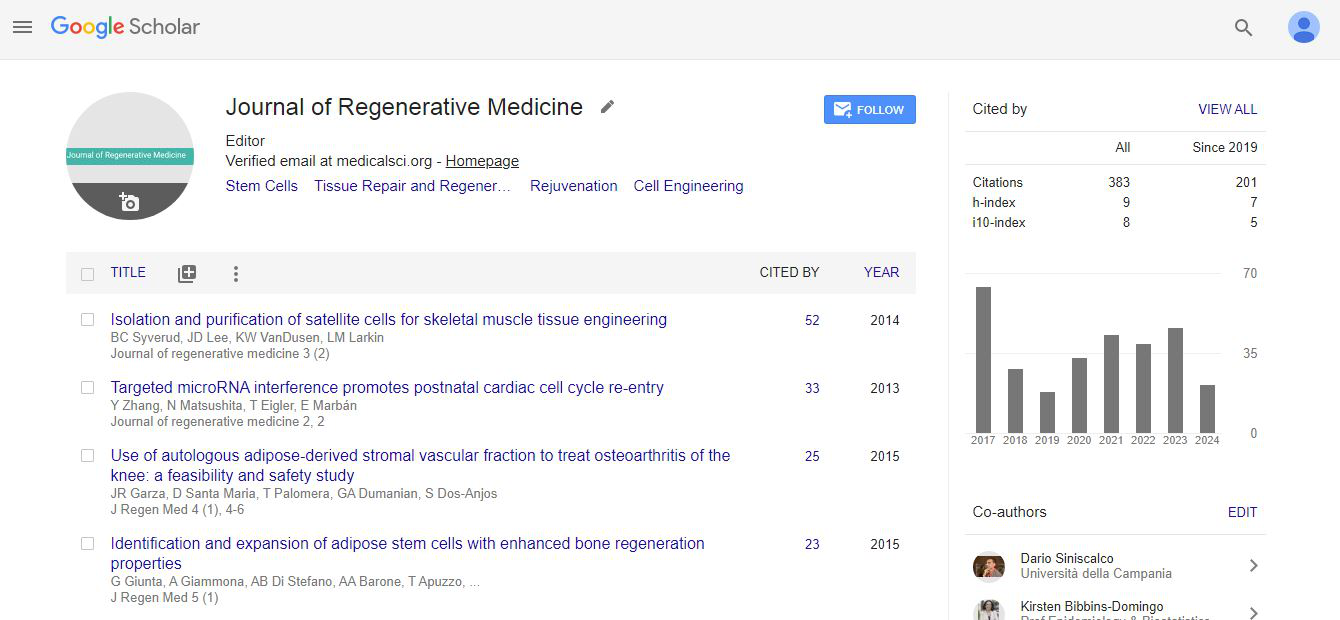Rapid Communication, J Regen Med Vol: 12 Issue: 3
Biotherapeutics: Pioneering the Future of Medicine
Myung Joo*Graduate School of Analytical Science and Technology, Chungnam National University, Daejeon 34134, Korea
*Corresponding Author:Myung Joo
Graduate School of Analytical Science and Technology, Chungnam National University, Daejeon 34134, Korea
E-mail: jooM34@cnu.ac.kr
Received: 24-April-2023, Manuscript No. JRGM-23-108149;
Editor assigned: 26-April-2023, PreQC No. JRGM-23-108149 (PQ);
Reviewed: 10-May-2023, QC No. JRGM-23-108149;
Revised: 17-May-2023, Manuscript No. JRGM-23-108149 (R);
Published: 25-May-2023, DOI:10.4172/2325-9620.1000254
Citation: Joo M (2023) Biotherapeutics: Pioneering the Future of Medicine. J Regen Med 12:3.
Copyright: © 2023 Joo M. This is an open-access article distributed under the terms of the Creative Commons Attribution License, which permits unrestricted use, distribution and reproduction in any medium, provided the original author and source are credited.
Introduction
In recent years, biotherapeutics has emerged as a revolutionary field in medicine, offering promising treatments for a wide range of diseases. Unlike traditional small-molecule drugs, biotherapeutics are derived from biological sources, such as living cells, proteins, antibodies, and nucleic acids. These cutting-edge therapies leverage the power of biotechnology to target specific molecular pathways, opening new doors for personalized medicine and more effective treatments. In this article, we will delve into the world of biotherapeutics, exploring its potential, challenges, and its role in shaping the future of healthcare [1].
Understanding biotherapeutics
Biotherapeutics are a class of drugs that harness the inherent biological mechanisms of the human body to combat diseases. These therapies are designed to interact with specific molecules, receptors, or cells, influencing biochemical processes and signaling pathways. The most common types of biotherapeutics include monoclonal antibodies, vaccines, gene therapies, cell-based therapies, and therapeutic proteins [2].
Monoclonal antibodies: Precision targeting
Monoclonal antibodies (mAbs) are engineered to recognize and bind to specific antigens present on the surface of cells or pathogens. By targeting these antigens, mAbs can block harmful processes, modulate the immune system, and facilitate targeted destruction of diseased cells. These remarkable agents have demonstrated immense success in treating conditions like cancer, autoimmune disorders, and infectious diseases.
Vaccines: Prevention is better than cure
Vaccines are perhaps the most well-known form of biotherapeutics. They work by exposing the body’s immune system to a harmless version of a pathogen or a piece of it (e.g., proteins or genetic material). This exposure triggers an immune response, allowing the body to build memory cells that can recognize and eliminate the actual pathogen when encountered in the future. Vaccines have played a pivotal role in eradicating and controlling numerous infectious diseases worldwide [3].
Gene therapies: Rewriting the genetic code
Gene therapies hold the promise of treating genetic disorders by replacing, manipulating, or repairing faulty genes. These therapies often involve delivering functional genes into the patient’s cells, either directly or through viral vectors. Gene therapies have shown remarkable potential in addressing conditions like inherited disorders, certain types of cancer, and rare diseases with a genetic basis.
Cell-based therapies: Regeneration and repair
Cell-based therapies involve using living cells to replace or repair damaged tissues or organs. Stem cell therapies, for instance, utilize pluripotent or multipotent stem cells to regenerate tissues, offering hope for conditions that were previously considered incurable. These therapies have gained significant attention in the fields of regenerative medicine and tissue engineering.
Therapeutic proteins: Unlocking cellular processes
Therapeutic proteins are artificially synthesized versions of naturally occurring proteins in the body. They can augment or inhibit specific biological processes, providing targeted treatments for various medical conditions. Examples include insulin for diabetes, growth factors for cancer treatment, and clotting factors for hemophilia [4].
Challenges and future perspectives
While biotherapeutics offer groundbreaking solutions, their development and implementation come with unique challenges. High production costs, potential immune responses, and complex regulatory pathways are among the hurdles faced by researchers and companies in this field. However, ongoing advancements in biotechnology, genomics, and data analytics are likely to pave the way for more accessible and affordable biotherapeutics in the future [5].
Conclusion
Biotherapeutics have transformed the landscape of modern medicine, bringing hope to patients with previously untreatable or difficult-to-manage conditions. With their precision targeting, ability to modulate biological processes, and potential for personalized treatment, these therapies are poised to become a cornerstone of healthcare in the coming years. As research and technology continue to evolve, biotherapeutics will undoubtedly play a crucial role in shaping the future of medicine, offering new avenues for improved patient outcomes and better quality of life.
References
- Brennan F, Kiessling A (2017) In-vitro Assays Supporting The Safety Of İmmunomodulatory Antibodies. Toxicol In Vitro, 45(3):296-308.
- Kizhedath A, Wilkinson S, Glassey J (2017) Applicability of Predictive Toxicology Methods for Monoclonal Antibody Therapeutics: Status Quo and Scope. Arch Toxicol, 91(4):1595-1612.
- Demlova R, Valik D, Obermannova R, Zdrazilova-Dubska L (2016) The Safety of Therapeutic Monoclonal Antibodies: Implications for Cancer Therapy İncluding İmmune-Checkpoint İnhibitors. Physiol Res, 65(4):55–62.
- Sim D, Park K, Park H, Son Y, Lee S, et al. (2016) Clinical Characteristics of Adverse Events Associated with Therapeutic Monoclonal Antibodies in Korea. Pharmacoepidemoil Drug Saf, 25(11):1279–1286.
- Krishna M, Nader S (2016) Immunogenicity of Biotherapeutic-The role of Anti-drug Immune Complexes. Front Immunol, 7:1–12.
Indexed at, Google Scholar, Cross Ref
Indexed at, Google Scholar, Cross Ref
Indexed at, Google Scholar, Cross Ref
Indexed at, Google Scholar, Cross Ref
 Spanish
Spanish  Chinese
Chinese  Russian
Russian  German
German  French
French  Japanese
Japanese  Portuguese
Portuguese  Hindi
Hindi 